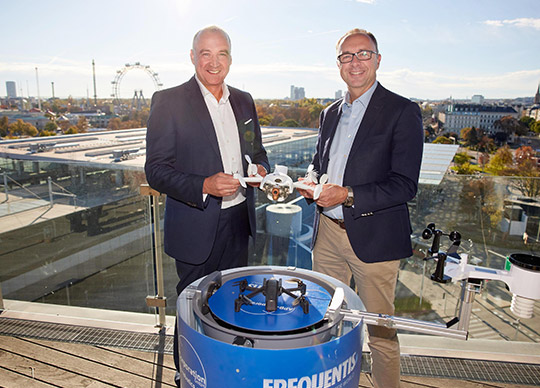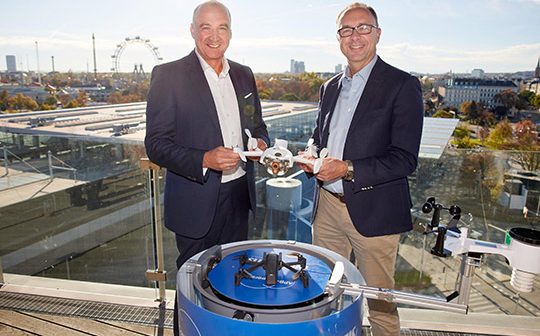

Image: Norbert Haslacher, Frequentis; Johann Pluy, ÖBB copyright: © ÖBB.
A recently signed innovation partnership with Frequentis, to research hangar-based automated drone flights in Austria, will now bring the Austrian Federal Railways (ÖBB) another important step towards enhanced safety, economic efficiency, and service availability. This is an important step in advancing the routine implementation of automated drone flights beyond line of sight.
The focus of the cooperation will be on the prevention of railway incidents through routine maintenance flights, leading to early detection of damage to infrastructure, natural hazard management, monitoring route availability, as well as emergency management at major events.
Routine maintenance flights are intended to quickly detect damage to the infrastructure, or hazards in the vicinity of the track, enabling resolution at an early stage. In practice, the implementation of so-called BVLOS flights – “Beyond Visual Line of Sight” – is a challenge, from both an administrative and technical point of view, and is still one of the most exceptional among drone flights.
To solve this, ÖBB-Infrastruktur AG and Frequentis AG have signed a unique cooperation agreement to improve the understanding of automated drone flights and their restrictions regarding official regulations, weather, and topography, among other things. The use of automated drones for railway applications will also be investigated. In the future, complex and automated drone flights outside the line of sight will be carried out in accordance with the rules and tested in various railway-relevant areas of application.
The use for digitalised railway operations is also being investigated to work out all aspects for the approval of these automated flights and to gather experience for their handling in an intensive trial operation over the next 12 months.
“This cooperation is an important step for us,” says Johann Pluy, Member of the Board of ÖBB-Infrastruktur AG. “With the help of BVLOS flights, we will not only increase the safety of our facilities but will also be able to handle extra tasks more frequently and at lower cost in the future. I am very excited about this promising cooperation with Frequentis.”
“The drone ecosystem is currently growing rapidly, with the number of commercial use cases continuously increasing,” explains Norbert Haslacher, CEO Frequentis. “We are pleased to join forces with our customer ÖBB to test the operational feasibility of hangar-based automated drone flights for future-oriented railway operations in Austria.”
Wide range of possible applications
The trial will allow Frequentis to gain knowledge regarding availability, stability, regulatory requirements, and possible applications of drone hangars, which will form a valuable basis for further innovations in the field of drone technology.
ÖBB says it hopes that the cooperation will result in obtaining the flight permit to enable automated drone flights from its operations centre. Once approval has been granted for trial operations weekly flights over ÖBB routes are planned at a minimum. The aim is to gather knowledge to continuously improve.
Over an initial period of one year, use cases such as incidents, checking route availability, forecasting and the effects of natural hazards, inspection activities, and shunting operations will be practised.






